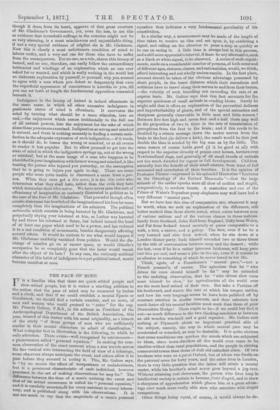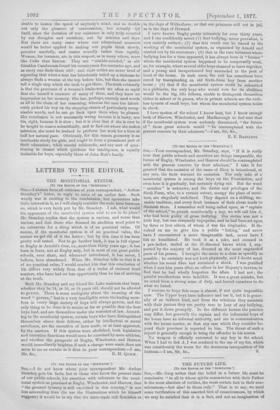THE PACE OF MIND.
IT is a familiar idea that there are quick-witted people and is people, but it is rather a startling addition to the notion that the pace of mind. may be measured by inches and a clock, and that if we could establish a mental Epsom or Goodwood, we should find a certain number, and no more, of men and women who could pretend to " enter " for the cup. Mr. Francis Galton, F.R.S., in his address as President of the Anthropological Department of the British Association, this year, treated of this matter with his usual originality, as a branch of the study "of those groups of men who are sufficiently similar in their mental characters to admit of classification." What a singular fact in illustration is the following, to whiCh he calls attention. There exists—well recognised by astronomers— a phenomenon called " personal equation." In making the com- mon observation of the exact moment when a star travels across the fine vertical wire intersecting the field of view of a telescope, some observers always anticipate the event, and others allow it to pass before they succeed in noting it. This, Mr. Gallon says, is"by no means the effect of inexperience or maladroitness, but is a persistent characteristic of each individual, however practised in the art of making observations he may be." The difference, between the time of a man's noticing the event and that,of its actual occurrence is called his "personal equation," and it is carefully aseertaindt1 for every assistant in every labora-
tory, and is published along with his observations It is not too much to say that the magnitude of a man's personal equation thus indicates a very fundamental peculiarity of his constitution.
In a similar way, a measurement may be made of the length of time taken to receive an idea and act upon it, by exhibiting a signal, and calling on the observer to press a stop as quickly as he can on seeing it. A little time is always lost in this process, and a still more appreciable interval, if there be any alternative, such as a black or white signal, to be observed. A series of such experi- ments, made on a considerable number of persons, of both sexes and of different ages, statures, elaseee, and nationalities, would, we think, afford interesting and not wholly useless results. In the first place, account should be taken of the obvious advantage possessed by short people, in the lesser distance which their sensations and volitions have to travel along their nerves to and from their brains, —the velocity of such travelling not exceeding the rate of an express train. Mr. Galton says that this fact accounts for the superior quickness of small animals in evading blows. Surely he might add that it offers an explanation of the proverbial dullness and imperturbability of giants, and of the special animation and sharpness generally observable in little men and little women ? Between five feet high and seven feet and a half there may well be the proportion of two to three in the rate of transmission of perceptions from the foot to the brain ; and if this needs to be doubled by a return message down the motor nerves from the brain to the foot (to deliver a kick), the result would. be that just double the time is needed by the big man as by the little. The same reason of course holds good (if it be good at all) with respect to the superior vivacity of ponies over horses, terriers over Newfoundland dogs, and generally of all small breeds of animals not too much dwarfed for vigour or full development. Children naturally lose the benefit of their small stature, from want of full command and correlation of their faculties. It is the opinion of Professor Flower—expressed in his splendid Hunterian "Lectures on the Osteology of the Extinct Mairanalia "—that the large animals of the earlier epochs were all slow of motion and stupid, comparatively, to modern beasts. A mastodon and one of the Prince of Wales's Nepaulese pony-elephants may well have had a very different "mental pace."
But we have lost this clue of comparative size, whatever it may be worth, when we seek an explanation of the difference, still better marked than those above noted, which exists between men of various nations and of the various classes in those nations. Sandy from Scotland, John Bull from England, Taffy from Wales, and Pat from Ireland travel mentally at paces comparable to a walk, a trot, a canter, and a gallop. The first, even if he be a very learned and able Scot indeed, when he sits down at a London dinner party, finds himself stranded two or three times by the tide of conversation between soup and the dessert ; while the last, even if he be a rather ignorant Irishman, will keep pace tant bien que nial, and scent a joke in the air, even if it consist in au allusion to something of which he never heard in his life.
Think, again, of a Frenchman's "mental pace,"—not a French peasant's, of course. The aphorism that he "who drives fat oxen should himself be fat" may be extended to the unfailing observation, that he "who drives slow oxen must himself be slow," for agriculturists all the world over are the most beef-witted of their race. But take a Parisian off his boulevard, and watch the rate at which his tongue rattles, and how his very language seems to have been polished off by constant attrition in similar torrents, and then calculate how much faster all his mental faculties must work than those of poor Dorsetshire Hodge ! There ought to be—if we could but find it out—as much difference in the two thinking-machines as between an old wooden windmill and a gold repeater. Mr. Gallon said nothing at Plymouth about an important practical side of
the subject, namely, the way in which mental pace may be accelerated or retarded, as may be desirable. It is quite obvious
that some conditions can quicken the minds which are subjected to them, since town-dwellers all the world over come to be nimbler-witted than rural populations, and the people in stirring commercial towns than those of dull old cathedral cities. Of two brothers who were on a par at Oxford, but of whom one dwells on the paternal acres for forty years, and the other lives in London, there is very little question that the latter will attain a mental canter, while his brother's mind never goes beyond a jog-trot.
Without attaining real cleverness, the person who lives long in intellectual society is certain to become frotte d'esprit, and to show a sharpness of apprehension which places him at a great advan- tage over much more really able men who associate with stupid companions. Other things being equal, of course, it would always be de- sirable to hasten the speed of anybody's mind, and so double not only the pleasure of conversation, but actually life itself, since the duration of our existence is only truly counted by our thoughts and emotions, not by minutes and days. But there are many cases where our educational measures would be better applied to making our pupils think slowly, perceive carefully, and reason soundly rather than rapidly. Women, for instance, are in this respect, as in many others, more like Celts than Saxons. They are "nimble-minded," as old Giraldus Cambrensis found his countrymen five centuries ago, and as every one finds them still ; and their critics are never tired of repeating that when a man has laboriously toiled up a staircase he always finds a woman at the top before him, but then she cannot tell a single step which she took to get there. The truth evidently is that the processes of a woman's brain-work are often so rapid that she herself is unaware of many of them, and they leave no impression on her memory. She has, perhaps, scarcely used words at all in the chain of her reasoning, whereas the man has labori- ously picked his way on the stepping-stones of particularly recog- nisable words, and he can go back upon them when he pleases. Her conclusion is not necessarily wrong because it is hasty, nor his, right, because it is slow ; but it is clear that if she is ever to be taught to reason scientifically, and to find out where she makes mistakes, she must be trained to perform her work for a time at half her natural pace. Obviously, for this reason geometry is an invaluable study for girls, and ought to form a prominent part of their education ; while mental arithmetic, and any sort of ques- tioning in classes which quickens the intelligence, is equally desirable for boys, especially those of John Bull's family.































 Previous page
Previous page